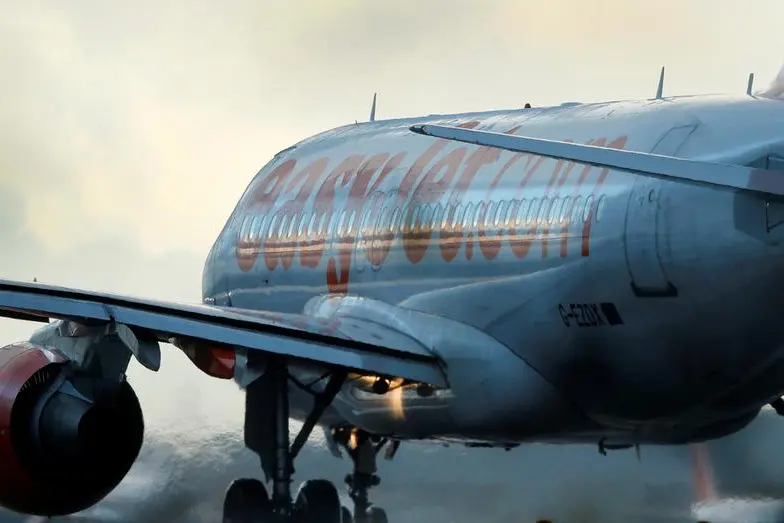PHOTO
EasyJet's big bets on package holidays and better-located airports are helping it win customers, its CEO and investors say, even as concerns linger about the high cost of the strategy for an airline known for its no-frills service.
The turnaround is part of a years-long effort by CEO Johan Lundgren to cut debt, revive the share price, and restore revenues after the pandemic.
Buying slots at better-located airports like London's Gatwick is paying off. As ticket prices have increased in recent years, that's appealing to consumers looking for a slightly higher quality travel experience than budget rivals Ryanair and Wizz Air.
The holiday package business, which launched in 2019 and accounted for more than a quarter of group pretax profit last year, is benefiting from a post-lockdown shift in consumer priorities towards vacations. In 2023, easyJet cleared its net debt to deliver net cash of 41 million pounds ($52 million).
"It definitely wasn't luck," said Davy analyst Stephen Furlong.
Last month, the British airline forecast a smaller-than-expected first-half loss and another strong summer. It will report first-half results on Thursday.
The stock has risen 8% over the last year, outpacing the global airline index, and rejoined London's blue-chip FTSE 100.
Some other airlines, meanwhile, are struggling to recover from the COVID crisis when planes were grounded and borders shut, and the industry faces headwinds from high wages to volatile jet fuel costs.
Lundgren, a former tour guide who wanted to be a professional trombonist and joined in 2017 from Europe's top tour operator TUI, is targeting profit per seat of 7-10 pounds by 2028, almost double 2019 levels.
In an interview in March, he said a surge in demand for travel was driving growth, but chance had played a part too.
By flying Airbus planes with CFM engines, easyJet has dodged the slowdown in deliveries from Boeing and the Pratt & Whitney engine recall that has grounded some planes at Wizz Air and others.
That means easyJet can capitalise on what is set to be a record summer for travel in Europe and benefit further from its holiday business' profitability.
"You can see that easyJet is growing more than any other European airline in Europe. We're growing at around 8% (for capacity)," Lundgren said.
"We are now ... in a net cash position, basically, through a big, strong resurgence in demand. Our revenue has grown tremendously."
HOLIDAYS WIN
This is in stark contrast to a few years ago.
In October 2022, easyJet shares hit a 10-year low and net debt was about 670 million pounds, stirring concerns it would be among the European airline industry's biggest pandemic losers.
While the package holiday business was launched just before tourism was crushed by the pandemic, Lundgren said trips to places like Antalya in Turkey and Barcelona in Spain were now a "phenomenal success". Tour firm Thomas Cook's demise in 2019 also helped easyJet's new business find customers, analysts say.
The holiday business made a pretax profit of over 122 million pounds in 2023, more than a quarter of the group total. The airline has set a target to double that by 2028.
That has helped to soothe worries about the costs of running a holiday business, and apparently quietened talk from a couple of years ago that easyJet might be a takeover target for British Airways-owner IAG or Wizz Air.
"Holidays growth has reduced market concerns around a widening cost base relative to ultra-low cost carriers," said RBC analyst Ruairi Cullinane.
NOT IN THE CLEAR
EasyJet shares are still well below pre-COVID level, though. They have fallen 39% since the start of 2019, or about 17% adjusting for two rights issues. That's in marked contrast to an 82% surge at Ryanair.
Ryanair CEO Michael O'Leary's warning last week that summer ticket prices are not rising as much as expected sent chills through the sector, pushing easyJet's shares down 4%.
Possible disruptions also loom after pilots union BALPA rejected a pay offer this week. Higher labour costs and strikes hit rival Lufthansa's results in the first quarter.
"We are disappointed that the pilot pay deal was narrowly rejected. We remain in constructive dialogue with BALPA and no strike action is planned," an easyJet spokesperson said.
Still, Lundgren said the airline was committed to its dividend, would invest in renewing its fleet and bolster the holiday business to meet its medium-term targets.
"We know exactly what needs to be done," he said.
($1 = 0.7926 pounds)
(Reporting by Joanna Plucinska; Editing by Josephine Mason and Mark Potter)





















